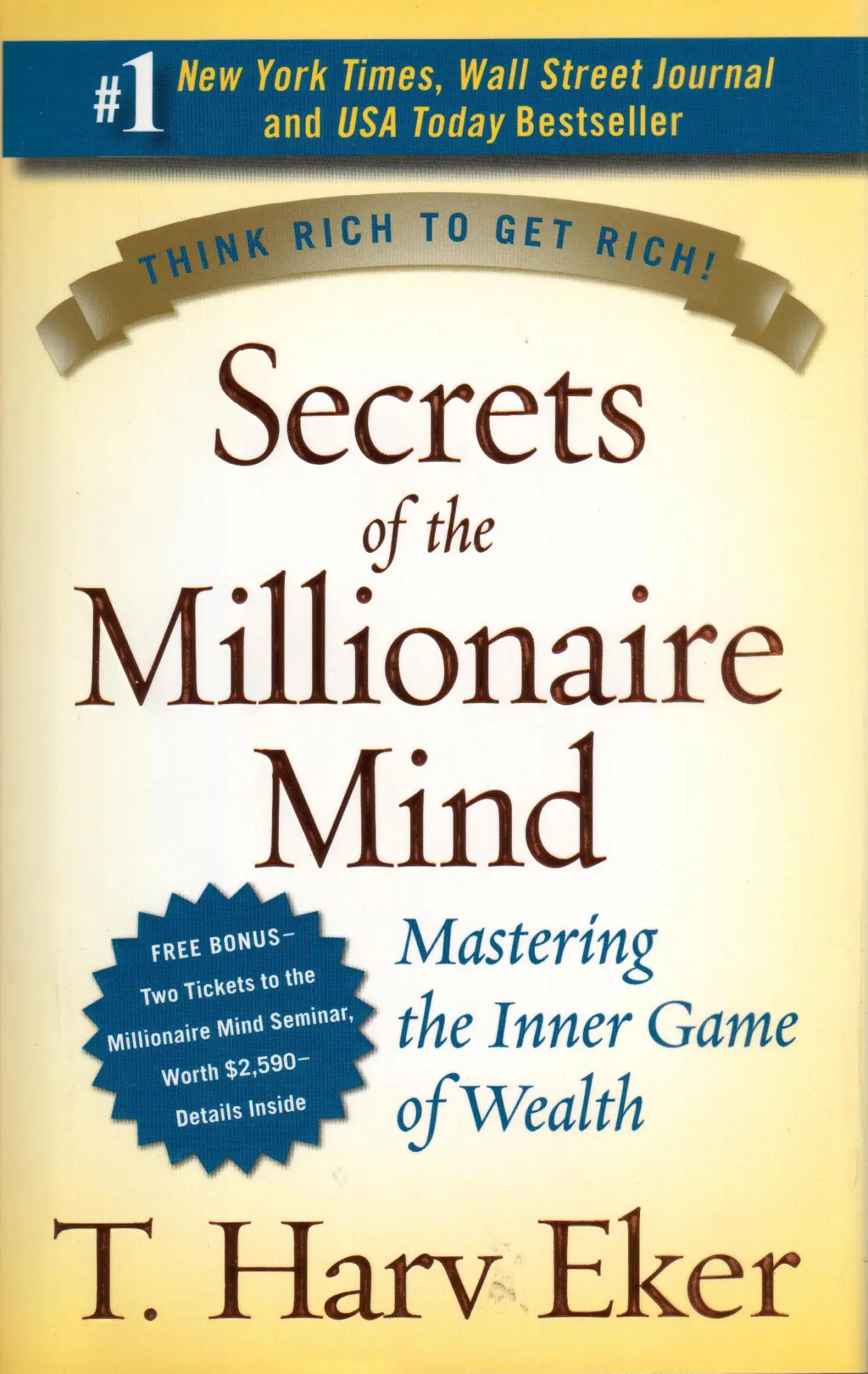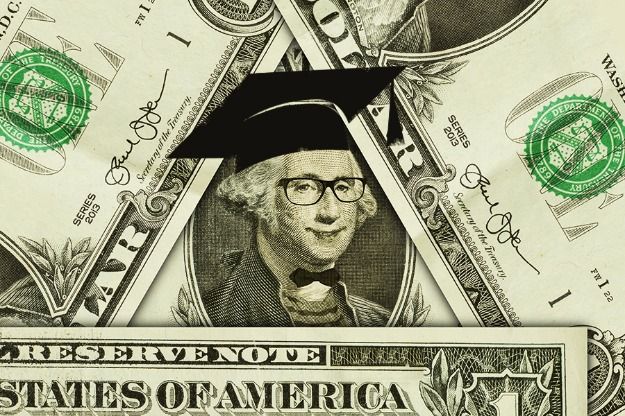![]() Are you looking for the best money books? Then you'll love this article. The fact is money matters and while these personal finance books won’t transform you into a saving expert, but they will help you get started — which is far more important.
Are you looking for the best money books? Then you'll love this article. The fact is money matters and while these personal finance books won’t transform you into a saving expert, but they will help you get started — which is far more important.
Taking control of your finances starts with getting your personal financial life in order. An easy way to do that is by educating yourself with the best money books we've found.
Here’s a list of top personal finance books that will help you to gain some valuable perspective on managing your personal finances and achieve the treasure that you most certainly deserve.
Money tip: If you want to educate your children on personal finance on a budget, you should see how to get free books for kids. These can really help the next generation of readers reach their potential.
Must-Read Books on Personal Finance
Personal finance books can empower you to budget, save for retirement, get out of debt and tackle many other money-related decisions with confidence. But the possibility of falling down an Amazon rabbit hole or spending all day at the bookstore debating which title to pick is enough to deter some folks. We’ve narrowed down our recommendations of the top personal finance books to put you back in charge of your money and finances.
8 Best Money Books for Millennials
We’ve narrowed down our recommendations of the top personal finance books and best money books to put you back in charge of your money and finances:
- Think and Grow Rich: by Napoleon Hill.
- The Millionaire Fastlane: by MJ DeMarco.
- Secrets Of The Millionaire Mind: by T. Harv Eker.
- The Millionaire Mind: by Thomas J. Stanley.
- The Secret: by Rhonda Byrne.
- The Total Money Makeover: by Dave Ramsey.
- The Millionaire Next Door: by Thomas J. Stanley.
- The Richest Man In Babylon: by George S. Clason.
1. Think and Grow Rich by Napoleon Hill

In Think and Grow Rich the author provides thirteen principles through which you can become as rich as you desire.
Written in the 1930's, this book's principles are based on the minds of people like Andrew Carnegie, whom Napoleon Hill knew personally, and Henry Ford whom Hill studied intensely.
Hill takes the methods from people like Carnegie and dissects them into processes the common man can follow to achieve high economic status.
Why you should read it:
“Think and Grow Rich” by Napoleon Hill offers timeless principles on success and personal development. Reading it provides:
- Proven steps to achieve personal and financial success.
- Insights into the mindset of successful individuals.
- Motivation through real-life examples.
- A structured approach to goal-setting and manifestation.
It's a foundational text for those aiming to improve their circumstances and realize their dreams.
Buy on Amazon2. The Millionaire Fastlane by MJ DeMarco

MJ Demarco takes a unique approach to teaching you how to acquire wealth.
He raves, there are three options when it comes to wealth, the fast lane, the slow lane, and the sidewalk.
If you want to acquire real wealth read this and discover how to shift from the sidewalk to the fast lane.
Why should you read it?
“The Millionaire Fastlane” by MJ DeMarco challenges conventional financial wisdom. Reading it provides:
1. A perspective that contrasts the “slow” path to wealth.
2. Principles for creating scalable businesses.
3. Insights on leveraging time and money for faster wealth accumulation.
4. A practical roadmap to financial freedom and affluence.
It's a guide for those seeking an alternative path to traditional wealth-building advice.
Buy on Amazon3. Secrets Of The Millionaire Mind by T. Harv Eker

As the title suggests Eker breaks down the mind of millionaire and compares it to that of a poor man. In doing this the reader is able to find a clear distinction between the poor man and the rich man. Thus showing wealth starts with a mindset and can be achieved no other way.
Why should you read it?
“Secrets Of The Millionaire Mind” by T. Harv Eker delves into the psychology of wealth. Reading it provides:
1. Understanding of how money beliefs impact financial outcomes.
2. Tools to reset one's financial thermostat for success.
3. Insights into habits and thinking patterns of the wealthy.
4. Practical exercises to reframe and transform money mindsets.
It's essential for those looking to shift their mental frameworks to achieve financial prosperity.
Buy on Amazon4. The Millionaire Mind by Thomas J. Stanley

The basis of The Millionaire Mind is to provide an overview of the average millionaire, not the Fortune 500 millionaires, but the ones that made their money through a very attainable means.
The author takes the approach of supplying the reader with statistics about the average millionaire, which makes the reader feel like becoming a millionaire is no longer a wild dream but an attainable goal.
Why should you read it?
“The Millionaire Mind” by Thomas J. Stanley provides an in-depth study of millionaires. Reading it offers:
1. Insights into the habits and characteristics of the truly wealthy.
2. Contrasts between perceived and actual behaviors of millionaires.
3. Financial decision-making strategies of the affluent.
4. An understanding of the values and priorities that drive financial success.
It's a window into the practices and principles that underlie genuine wealth accumulation.
Buy on Amazon5. The Secret by Rhonda Byrne

The Secret is a book based on the law of attraction. A universal law that when learned how to harness, anyone is able to attract the amount of money they desire. Byrne gives multiple testimonials of people applying the law of attraction and getting exactly what they imagined many years prior.
Why you should read it?
“The Secret” by Rhonda Byrne introduces the law of attraction. Reading it provides:
1. Insights into manifesting desires through positive thinking.
2. Techniques to attract personal and professional success.
3. Inspirational stories and testimonials.
4. A perspective on reshaping one's reality through focused intention.
It's a guide for those seeking to harness the power of their thoughts to shape their lives.
Buy on Amazon6. The Total Money Makeover by Dave Ramsey

One of the greatest books in its category. If financial literacy is what you seek then look no further. Ramsey takes a very educated approach to teaching his readers how to properly handle their money.
He does this by using factual evidence and saying things like, “A new 28,000 car will lose about 17,000 of value in the first four years you own it. To get the same result, you could toss a 100 bill out the window once a week during your commute.”
Dave Ramsey provides practical, baby steps that if taken, will help you learn how to properly handle money.
Why you should read it?
“The Total Money Makeover” by Dave Ramsey offers a step-by-step plan for financial health. Reading it provides:
1. Practical strategies for debt elimination.
2. Principles for effective budgeting and saving.
3. Guidance on building wealth and retirement planning.
4. Motivational success stories of those who've transformed their finances.
It's a blueprint for those aiming to achieve financial stability and freedom.
Buy on Amazon7. The Millionaire Next Door by Thomas J. Stanley

Yet another book that teaches people the proper steps and attitude to attain wealth. One of the main points made by Stanley is that it's not how much you make that makes you wealthy it's what you spend.
He gives practical steps for the reader to follow in order to help you out of debt by creating a lifestyle.
Why you should read it?
“The Millionaire Next Door” by Thomas J. Stanley reveals the habits of the quietly wealthy. Reading it offers:
1. Insights into the real behaviors and lifestyles of self-made millionaires.
2. Debunking of myths about luxury and extravagance.
3. Strategies for building and preserving wealth.
4. An understanding of the importance of living below one's means.
It's an eye-opener for those seeking to understand and emulate the true habits of financial success.
Buy on Amazon8. The Richest Man In Babylon by George S. Clason

 You can buy it here.
You can buy it here.One of the most commonly known books for money management. Jim Rohn, a very successful motivational speaker, attributes a great amount of his success to this book alone.
This book provides multiple money management principles to live by through the telling of a parable. These principles include saving, investing, doing work you love and becoming excellent, watching out for self-serving brokers, and education never stops.
Through these principles, you can set the foundation for a wildly successful life.
Why should you read it?
“The Richest Man In Babylon” by George S. Clason provides timeless financial wisdom through ancient parables. Reading it offers:
1. Fundamental principles of money management.
2. Simple strategies for wealth accumulation.
3. Lessons on the importance of saving, investing, and seeking wise counsel.
4. Time-tested advice applicable in modern times.
It's a classic guide for anyone aiming to achieve financial prosperity and security.
Buy on AmazonFAQs on the Best Money Books for Financial Independence and Wealth Building
What is a good personal finance book for beginners?
For beginners looking to understand the basics of personal finance and start making smart financial decisions, “The Total Money Makeover” by Dave Ramsey provides a step-by-step guide to managing money, paying off debt, and building wealth. Its straightforward advice is particularly geared towards those new to financial planning.
Can you recommend personal finance books that focus on financial freedom?
Absolutely. “Your Money or Your Life” by Vicki Robin and Joe Dominguez is a classic that focuses on changing your relationship with money to achieve financial independence. For a modern take, “The Simple Path to Wealth” by JL Collins, which centers on low-cost index funds and simple strategies, is highly recommended.
What are the best personal finance books for young adults?
Young adults will benefit from “I Will Teach You to Be Rich” by Ramit Sethi, which offers a six-week program for financial success targeted at millennials. Another great read is “Rich Dad Poor Dad” by Robert Kiyosaki, which contrasts the financial philosophies of two father figures, shaping the reader's mindset towards money.
How can I learn about value investing and the stock market?
To dive into value investing and the stock market, “The Intelligent Investor” by Benjamin Graham is a seminal work, teaching the philosophy of value investing and long-term strategies. Warren Buffett, a disciple of Graham's principles, is a testament to its time-tested advice.
What books should I read for retirement planning and managing personal finances?
For retirement planning, consider “The Automatic Millionaire” by David Bach, which showcases how to automate your financial plan to build wealth over time. “The Bogleheads' Guide to Retirement Planning” by Taylor Larimore and others is also essential reading for understanding retirement planning and investment.
Are there any books that combine personal finance advice with achieving early retirement?
One of the most influential books on this topic is “The Millionaire Next Door” by Thomas J. Stanley and William D. Danko, which reveals the spending and saving habits of wealthy individuals who live frugally and retire early. “Early Retirement Extreme” by Jacob Lund Fisker offers a radical approach to financial independence and retiring early.
Which personal finance books include a comprehensive approach to building wealth?
“Think and Grow Rich” by Napoleon Hill is often cited as a must-read for those looking to build wealth through personal development and positive thinking. “The Wealthy Barber” by David Chilton provides practical and accessible financial advice through a narrative about a wise local barber.
What's a good book for learning about managing money and making smart financial moves?
“Get a Financial Life” by Beth Kobliner is ideal for those in their twenties and thirties, providing practical advice on all aspects of personal finance, from dealing with debt to investing wisely. It's especially useful for those looking to make smart money moves early in their financial life.
Is there a financial advisor who has written a book about intelligent investing for long-term growth?
Yes, “Common Sense on Mutual Funds” by John C. Bogle, the founder of Vanguard and the advocate of low-cost index funds, offers invaluable insights into intelligent investing for sustainable growth. His strategies are praised for being straightforward and highly effective for long-term investors.
Which finance books should I read if I am interested in the psychological aspects of money?
“The Psychology of Money” by Morgan Housel provides a collection of short stories exploring how people think about money differently and how it affects their financial decisions. It's a must-read for understanding the personal and emotional relationship with money.
Remember, while reading these books can provide you with a wealth of knowledge, implementing their advice and tailoring it to your personal situation is key to truly managing your finances effectively. Always consider your unique circumstances and, if needed, consult with a certified financial planner.
Use These Best Money Books to Take Action
Here's a recap of the best money books for 2024:
- Think and Grow Rich: by Napoleon Hill.
- The Millionaire Fastlane: by MJ DeMarco.
- Secrets Of The Millionaire Mind: by T. Harv Eker.
- The Millionaire Mind: by Thomas J. Stanley.
- The Secret: by Rhonda Byrne.
- The Total Money Makeover: by Dave Ramsey.
- The Millionaire Next Door: by Thomas J. Stanley.
- The Richest Man In Babylon: by George S. Clason.
So now, you have no shortage of inspiration when you are worried about managing your personal finance. Next, you can pay down your student loans, start investing for retirement, or start making supplemental income.
Next, you can take a look at the best entrepreneur books so that you can build an online business and make extra money.
Did you like this list of best money books of 2024? What book would you have added to the list?
- 1. Think and Grow Rich by Napoleon Hill
- 2. The Millionaire Fastlane by MJ DeMarco
- 3. Secrets Of The Millionaire Mind by T. Harv Eker
- 4. The Millionaire Mind by Thomas J. Stanley
- 5. The Secret by Rhonda Byrne
- 6. The Total Money Makeover by Dave Ramsey
- 7. The Millionaire Next Door by Thomas J. Stanley
- 8. The Richest Man In Babylon by George S. Clason
- FAQs on the Best Money Books for Financial Independence and Wealth Building










